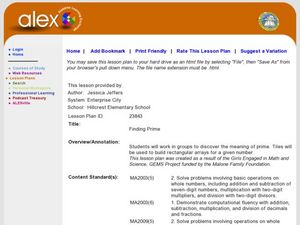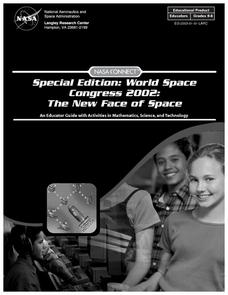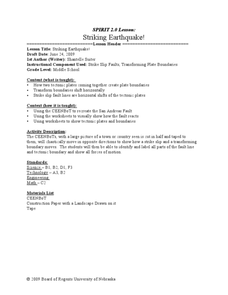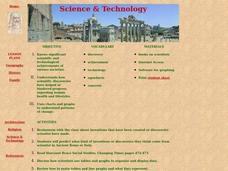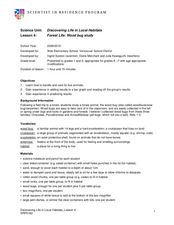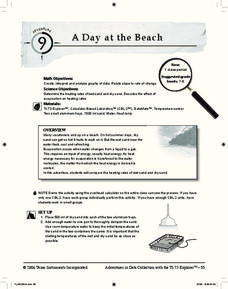Curated OER
Archaeology
Students read archaeology books, define it and discover how math and science help us learn about the past. In this investigative lesson students give a description of archaeology and two facts that they learned.
Curated OER
Arkansas' Top Ten Events of the Century....Says Who? Why? Deciding What is Important in History
Middle and high schoolers work in small groups to compare four different lists published in the Arkansas Times newspaper which chose the "top ten" Arkansas news events of the 20th century. Learners look for similarities and differences...
Alabama Learning Exchange
Finding Prime
Fifth and sixth graders explore prime numbers. They work with a partner to build rectangular arrays using twelve tiles. Factor pairs are noted and recorded on graph paper. Pupils construct rectangular arrays with a prime number and...
Scholastic
Prescription Pain Medication: What You Need to Know
The national epidemic of opioid addiction is making its way into high school populations. Educate the students in your class about the ways prescription opioids can both block pain and deliver large amounts of dopamine that make it very...
Scholastic
Recovery From Drug Addiction
Are there factors that put some individuals at a higher risk for drug addiction than others? Learn more about the risk factors that may make some people more susceptible to addiction, as well as protective factors that help prevent...
Curated OER
The Solar Cycle
Learners research the solar cycle. In this Science lesson, students use the internet to investigate the solar cycle. Learners produce a spreadsheet and graph from the information collected.
Curated OER
Velocity of Traffic on Highway 26
Physics fanatics time five cars as they pass on the highway. They use the times and a 20-yard distance to calculate velocity. They also graph distance vs. time. A page of student pre-lab questions is provided in addition to the activity...
Curated OER
The Four Groups of Biologically Important Compounds
This is not they typical set of teacher instructions. It is an organized chart of the important organic compounds. For each, the involved elements, the name of the building block monomers, the names of polymers, extra information, and a...
Curated OER
Special Edition: World Space Congress 2002: The New Face of Space
Students experience and study how space offers expanding resources for commerce, science, technology and education. They view how advances in space can and do improve life on Earth. Each student views a geological exploration within this...
Curated OER
How Big is a Breath?
Students demonstrate how to use math skills to measure their lung capacity. In this human biology lesson, students use a clear plastic container, measuring cup and rubber balloons to demonstrate how the lungs work. Students estimate the...
Curated OER
Measuring Soil Temperatures at South Penquite Farm
Students investigate soil temperatures. In this graphing and earth science lesson, students insert temperature probes into different types of soil at varying depths. Students complete a data chart and construct a related graph...
Curated OER
Predicting the Future
Young scholars examine how scientists predict the effects of global climate change. In this environmental science lesson, students participate in a discussion about using computer generated data to create climate predictions. Young...
Curated OER
Why Is Our Stream Changing?
Young scholars test turbidity, pH, oxygen content and temperature of local stream. In this earth science lesson plan, students collect and record data from the experiment. They analyze findings and present it to class.
Curated OER
Normal (dip-slip) Earthquake!
Students label the fault lines and tectonic plate boundaries on the world map. In this earth science lesson, students simulate ocean floor formation using CEENboTs. They explain the causes of earthquakes.
Curated OER
Striking Earthquake!
Students simulate strike slip faults using CEENBoTs. For this earth science lesson, students identify the fault lines and tectonic plates on a world map. They label the different parts of a fault line.
Curated OER
Quickies
In this math problem solving worksheet, students answer 5 problems in 10 minutes. The problems include a variety of questions that could be solved by students who have had geometry and algebra.
Curated OER
Pascal's Triangle
In this math worksheet, students read the discussion about the importance of games. They create a game as directed. They also read the rules for the Pascal Triangle.
Curated OER
SPIRIT 2.0 Lesosn: Adding and Subtracting Integers
Six pages prepare you to introduce your math stars to the addition and subtraction of positive and negative numbers. They drive a robot back and forth on an actual number line to represent the operations. If you don't have access to a...
Curated OER
Saving Humpty Dumpty;Recycling, Environmental Science, Math, Ecology, Athletic Shoes
Pupils describe how shoe design, manufacturing, retailing, consumer use, and disposal impact environments and societies. They discuss ways to reduce, reuse, or recycle resources in the life-cycle for a shoe product.
Curated OER
Science and Math Lab (Students Look at Symmetry in Nature)
Pupils study patterns. In this symmetry in nature activity, students examine objects to determine what type of symmetry they have. They work in small groups to rotate through stations that have objects for them to study.
Curated OER
Science and Technology
Pupils research inventions that have been created. In this historical technology instructional activity, students read the Harcourt Brace social studies textbook and discuss how inventors used graphs to display data. Pupils create a...
Curated OER
Forest Life- Wood Bug Study
Examine wood bugs and their habitat. Learners gather wood bugs and examine their bodies. Then discuss their body parts and how they help them survive. They also predict where they think wood bugs live to then graph the class results.
Curated OER
A Day at the Beach
Help learners determine the rate of change for the temperature of sand. They will collect data on the temperature of wet and dry sand over time with a heat lamp overhead. Then make a scatter plot of the data and find a linear model to...
Mascil Project
Epidemics: Modelling with Mathematics
The Black Death epidemic is responsible for more than one million deaths in the United Kingdom. An inquiry-based activity has young scholars explore the rate of disease spread. They then analyze graphs showing data from epidemics such as...
Other popular searches
- Math and Science Careers
- Integrated Math and Science
- Science and Math
- Science/ Math Games
- Math and Science Activities
- Integrating Math and Science
- +Math and Science Careers
- Math and Science Plan
- Math and Science Lessons
- Word Origins Science Math
- Math in Science Experiments
- Science Math


